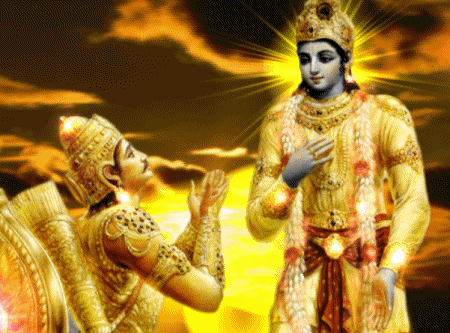Performance of obligatory duty is a primary goal of life, leading to the evolution of the personality in the current incarnation and eventually to enlightenment in later incarnations if the pace of evolution is consistently sustained. This consists in discharging responsibility towards family, community and the world at large, being diligent, dexterous, industrious and righteous, fighting for and supporting what is right. Abdication and abandonment of responsibility through disinclination, fear or mistaken and premature asceticism and reclusion is deemed false renunciation which does not lead to salvation. Renunciation means renouncing the fruits of action by engaging in unattached action and not the mistaken renunciation of ones obligatory duty. Even God is consistently engaged in discharging his responsibility and acting to sustain his creation setting an example for the performance of obligatory duty.
Textjual References:
” Engage yourself in obligatory work; for action is superior to inaction, and if inactive, even the mere maintenance of your body would not be possible.”
”Therefore consistently perform your obligatory duty without attachment; for, by doing duty without attachment man verily obtains the supreme.”
”None can ever remain really actionless for a moment; for, everyone is helplessly driven to action by the Gunas of Prakriti ( nature).”
”The abandonment of any obligatory duty is not right; such abandonment out of delusion is Tamasik ( misguided)”
”It is indeed impossible for an embodied being to renounce action entirely. But he he who renounces the fruits of action is regarded as the one who has (truly) renounced.”
”One should not abandon, O Kaunteya, the duty to which one is born, though it be imperfect (station in life), for all undertakings have imperfections even as fire is attended by smoke.”
”There is naught in the three worlds, O Partha, that has not been done by me, not anything unattained that might be attained; still I engage in action.”
”If ever I did not engage in work relentless ( performing my obligatory duty towards creation), O Partha, men would in every respect follow my path.”
”These worlds would perish if I did not do action; I should be the cause of confusion of species ( by not enforcing the natural laws) and I should destroy these beings ( the end of the world would ensue).”




![krishna_19_full[1]](https://indrajitrathore.files.wordpress.com/2015/04/krishna_19_full1.jpg?w=600&h=401)










